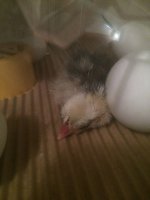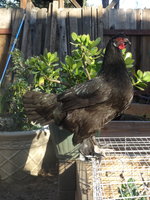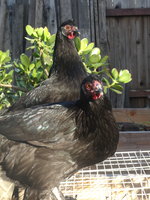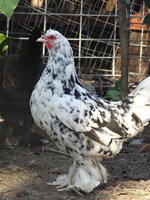Quote: To breed chocolate into a breed, you must take a black rooster and breed that to a chocolate hen. Then save the hens and breed back to one of the black offspring cockerels.
Then the following generation you should produce all chocolate. Then those offspring should be bread back to the black breda for several generations to produce the true chocolate Bredas.
rreaQuote:
I tend to agree with you on that point. Other breeds are used to introduce colors and other traits into many breeds. However it really results in some inherit problems some times that takes years to breed out. A lot depends on what breeds are used to develop what with what you have. In the case of the Breda, since it is known to be a predecessor to many modern day chickens it seems a shame to further mix up the breed and sending them on a backwards spiral. They had been extinct in the U.S. as a specific breed until the last decade of so. It seems a shame to go back to inbreeding in my books.Wouldn't bringing a different breed in to breed chocolate then make that flock not pure?.
I want to preserve what I have, not being in another color from another breed just to get chocolate.
My example is this: As I mentioned before, the Breda originally came in the cuckoo pattern but when they brought them back into the U.S. the cuckoo pattern obviously wasn't included. Now in the example of @Sylvester017 cuckoo Breda. ( I hope you don't mind me using her as an example....No criticism meant at all!!!) The cuckoo pattern was obviously re-introduced by cross breeding which resulted in a different colored egg. By all general standards her bird looks and is for the most part a pure Breda, but at the loss of the correct egg color. If they were an accepted APA breed that could be shown that would be a dis-qualifier. The positive that comes from that is that she may now have a heartier breed than it's predecessors.
The question I have here more than others is that doesn't that put one in the same mentality as hatcheries selling birds under a name when they are mixed with other breeds to get better laying or less feed consumption or something? Is the loss worth the change?
I prefer to focus on breeding the strongest birds and keeping them as pure as I can. Because they are in my opinion they are worth the effort as they are. Just my opinion and not meant to cause any disagreements.
Navigation
Install the app
How to install the app on iOS
Follow along with the video below to see how to install our site as a web app on your home screen.
Note: This feature may not be available in some browsers.
More options
You are using an out of date browser. It may not display this or other websites correctly.
You should upgrade or use an alternative browser.
You should upgrade or use an alternative browser.
Breda Fowl thread
- Thread starter klf73
- Start date
- Mar 24, 2012
- 16,982
- 320
- 391
I was so bummed losing my two Blue Breda juveniles plus our old Black Silkie adult but these 3 Dominique girls are helping to alleviate the sadness. Sweet, pesty, friendly, outgoing, curious, active breed -- going on 7 weeks. They're like mini-adults, foraging, scratching, dust-bathing, catching bugs, eating produce, and very friendly-pesty:



I don't get online much and haven't been on BYC (specifically the breda threads) in a while, but hopefully this is the right place to post. I am still very interested in adding Bredas to our flock at some point, the last time I was on here the place recommended to me was Rare Feathers Ranch. Is this still the case, and are there any updated suggestions on how to get my hands on blue Breda hatching eggs (chicks ok too but eggs preferred) locally (I'm in Sacramento, CA area) or places with affordable shipping? Thanks for your time!
There are more sources of Breda breeders now than in the past. Also, check Facebook for Breda references.
My personal Breda's came from 3 different sources and there's a 4th source I haven't ordered from only because they are on the opposite East coast from my location in the West.
RFR of CA (Rare Feathers Ranch of Calif) is where I got my Blue and Cuckoo Bredas but RFR has closed out their BBS (Blue/Black/Splash) and Cuckoo Breda and only have Black and White Mottled now. RFR vaccinates for Marek's and very pleasant to work with.
Waltz's Ark in Colorado has all the varieties of Breda but do not vaccinate for Marek's last time I ordered from them. My experience with them was less than stellar having received an incorrect order of a 4-month cockerel juvenile rather than pullet and the 2nd sickly juvenile had to be put down with Marek's disease.
chickendanz in KS currently has BBS (Blue/Black/Splash) Breda and is working hard to improve disease resistance in the BBS variety. Chicken Danz has recently put up a lovely website. Very professional to work with. https://voupex.wixsite.com/chickendanzfarm
Dutch Connection on the East Coast has had Black, Splash, and Cuckoo Breda varieties (do not offer Blue for some reason). My Cuckoo Breda at the time I purchased from RFR came originally from Dutch Conn stock. I've lost all my Blue Breda females from various breeder sources due to poor immune systems but my Cuckoo apparently is from a hardier cross-breeding and is the only Breda variety that never had a compromised respiratory issue like all my Blues had.
Breeders are working on improving disease resistance in the BBS Breda variety -- hatch and juvenile mortality can be as high as 50% or more but diligent breeders are researching to strengthen the Breda breed. They are such a lovely bird both physically and temperamentally and good to excellent layers. I have loved every Breda we've had and wish I had proper zoning to start a breeding project of my own!
Because of the delicacy of shipping Breda chicks or older juveniles due to stress, I would recommend ordering hatching eggs -- that way the hatching mortality issue won't be as expensive as losing USPS shipping costs of stressed live birds. Stress from shipping can bring on latent issues like coccidia, respiratory issues, even can bring on Marek's symptoms -- you'd be surprised at how many breeder flocks are unaware their birds carry latent viruses like Marek's, MS/MG, etc etc and shipping stress can actually bring down a bird's resistance. Some standard breeds don't have shipping issues while the rarer less resistant breeds can easily succumb. Of course, picking up chicks or adult birds in person is the absolute best first choice, and getting hatching eggs a good alternate way to go if cost is an issue. Breda chicks IMO are too rare and delicate to ship and most breeders won't ship Breda chicks anyway. Shipping older bigger juveniles or adult Breda gets expensive in USPS shipping costs as weight is a contributing factor in addition to the USPS shipping rate.
Personally I've always ordered shipped juvenile pullets because I have no space to conduct a hatching and brooding space for new chicks and have no outlet for unwanted cockerels. Wish I could hatch and keep surplus cockerels for the dinner table but my DH believes the Breda are too rare to kill off and won't eat his pets -- LOL!
Had Breda since 2013. Still have some of my original birds. They all started out as BBS, but three hens became molteds after a couple of years of age. Should be cranking up the incubator soon.Hurray! Another breeder on the horizon! There are a few additional owners of Breda this past year so you should be able to find a better roo for your breeding program. Keep us informed of your project.

I got my first Breda back in about 2012 and still have at least a couple of the original birds who still lay once in a while. Critterbug I too now have some "mottles" but they are reverse color which is white with black spots rather than the opposite. Those are actually "sports". Beautiful none the less and I think prettier than the traditional mottles.Had Breda since 2013. Still have some of my original birds. They all started out as BBS, but three hens became molteds after a couple of years of age. Should be cranking up the incubator soon.
The reason most people experience losses with new rare breeds is often because of a limited gene pool. Greenfire farm has started getting smart when importing after this repeated problem their customers experience by importing unrelated birds and then later importing another group. Unfortunately they didn't have that practice when they imported Bredas. So getting different genetic is kind of a luck of the draw.I don't know if others have experienced this or not, but every time I bring in a rare breed I have about 20% losses in the first year. After that I choose the strongest birds to breed and don't see many losses in the following years (unless something like MS/MG is introduced to the property). It seems like it takes some adaptation with them the first year.
Also when getting a new breed it's really important to get your birds from different breeders. I got my bredas as eggs from different suppliers but it is still a very limited gene pool.
I've been putting virtually every egg I get in the incubator. I've hatched several bredas and have gradually added some of those to my breeding pen. Of course I've also sold a number of them as well. I'm monitoroing them for leukosis. Unfortunately you can't tell if they have it or not until they get 4-9 months old. I've been very lucky and in the past 8 months only had 3 birds show any signs. Those birds were culled. I have three breeds of birds which I am considering doing some crosses with to improve resistance to leukosis and still keep the same Breda traits. Locating those birds is the hardest part. My guess is it would take close to two years to produce true Breda from this mix but it would be worth it if I could bring back the hardiness to all of them.So how many plan on hatching a bunch of breda this spring? I didn't hatch any last year. This year every egg to the incubator. Only problem is most of my males are yucky.To much red in the lobe.
@Sylvester017 , I have to disagree on the MS/Mg thing and Breda fowl. There are many many viruses that cause the sniffles in birds. MG is a reportable disease in Kansas and if you have birds with it, the entire flock would be culled by the state dept of health. It is vertically transferred as well as transferred from bird to bird. I would cull every bird on the place if any had it. MS is also vertically transferred but doesn't effect as many birds. But those birds would always have a predestination of becoming ill again if they were stressed or worn down. I used to treat all my birds to get them well. Now they are quarantined and if they don't improve in a short time period I cull them.
We naturally have a few bouts of colds or sniffles here and there during migration periods. But I've tried to limit feed accessible to wild birds which has helped reduce it a lot. Our problem here is aspergillus. Not a communicable disease, but a problem from too much moisture. Our rain, snow etc seem to come in huge amounts in a short period of time. That makes for very wet conditions. So mold forms, and rather than ingest it, the birds breath it in. Then you have a chronic sneezing and congested bird. Thank goodness it isn't something they catch from one another because there is no treatment. It tend to affect the free rangers the most.
Well I partially agree with you on that part. But you had said, Quote "but every time I bring in a rare breed I have about 20% losses in the first year." You didn't specifically say every time I bring in a new import. I only used Greenfire farms as an example since they are the ones that imported the Breda fowl in recent history. And that is the gene pool most of us are working from.
As far as new imports go you are absolutely on point. Those imports aren't used to our bacteria, environment or viruses. It takes a while to build immunity. I have gotten many newly imported birds but have never purchased any from Greenfire. There are many other very good importers in the U.S. But just the same I have experienced losses that only affected the newly imported birds. The survivors of some of those birds have been sold to friends and over the years they have gained the immunity they needed to become a hearty breed.
As far as rare breeds though I still believe inbreeding is a problem. Mainly because finding quality stock is difficult and then finding other bloodlines of the same stock is even harder. For instance one of my newer rare additions is a very old breed but it took me nearly two years to find anyone who would sell me chicks. And I am still looking for some alternate bloodlines. Luckily these all are very healthy so the breeder must have outsourced elsewhere. But I still need to add some other lines in the next couple years.
I'm not a backyard breeder per say. I hatch thousands of chicks every year. But each year I hatch for myself and either give away, sell, or cull birds that aren't up to my standards. This also helps me see how each breed in general is producing. I try to sell only the best and my reputation as a breeder depends on that.
As far as new imports go you are absolutely on point. Those imports aren't used to our bacteria, environment or viruses. It takes a while to build immunity. I have gotten many newly imported birds but have never purchased any from Greenfire. There are many other very good importers in the U.S. But just the same I have experienced losses that only affected the newly imported birds. The survivors of some of those birds have been sold to friends and over the years they have gained the immunity they needed to become a hearty breed.
As far as rare breeds though I still believe inbreeding is a problem. Mainly because finding quality stock is difficult and then finding other bloodlines of the same stock is even harder. For instance one of my newer rare additions is a very old breed but it took me nearly two years to find anyone who would sell me chicks. And I am still looking for some alternate bloodlines. Luckily these all are very healthy so the breeder must have outsourced elsewhere. But I still need to add some other lines in the next couple years.
I'm not a backyard breeder per say. I hatch thousands of chicks every year. But each year I hatch for myself and either give away, sell, or cull birds that aren't up to my standards. This also helps me see how each breed in general is producing. I try to sell only the best and my reputation as a breeder depends on that.
Hatching season is now in progress. One of this year's first Breda hatchlings.

- Mar 24, 2012
- 16,982
- 320
- 391
I have a white breda. Had several others but only have one hen left now.Thank you! That hen is stunning; I love all the white on her. And come to think of it, a white Breda would be beautiful! Somebody should get on that.
I am so sorry. It's so easy to become attached to those special babies. I just told someone yesterday the day my One Wing dies is going to be like loosing a child.Sad day here! A few minutes ago, Pegs my disabled rooster died in my arms.
He lived a short but hopefully happy life here - he will be missed
On the note of Bredas the girls are laying really well right now. However fertility has taken a little dip for some reason. Not sure what that is about. I was at a major yearly event this weekend and a person who had bought a single Breda chick says they want to buy a bunch more. Guess that little girl won their hearts over.
I'm slowly getting my birds together to work on the Bredas and strengthen the genetics. I know it's going to be a somewhat long journey but I'm pretty excited about doing it. The biggest problem with this venture is that the breeds used are on the endangered or critical list so at the same time I want to raise and work on them. I swear I will never be able to reduce my numbers at this rate!
New posts New threads Active threads
-
Latest posts
-
-
Open Contest May Madness, a Random Funny Posting Contest
- Latest: Hayden Goseek
-
-
-
-
-
Latest threads
-
-
-
-
I am really starting to believe that Princess is actually a Prince
- Started by Logar
- Replies: 2
-
-
-
Threads with more replies in the last 15 days
-
-
-
Ended Official BYC Caption Contest 05-10-24 Pic by LavenderDaFlerf
- Started by BYC Project Manager
- Replies: 81
-
-
Open Contest BYC's 4th of July Star Spangled Hatch-Along—Stars, Stripes, & Feathers, a Text-to-Image Contest
- Started by Debbie292d
- Replies: 78
-





